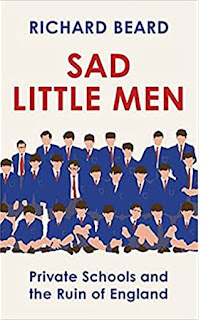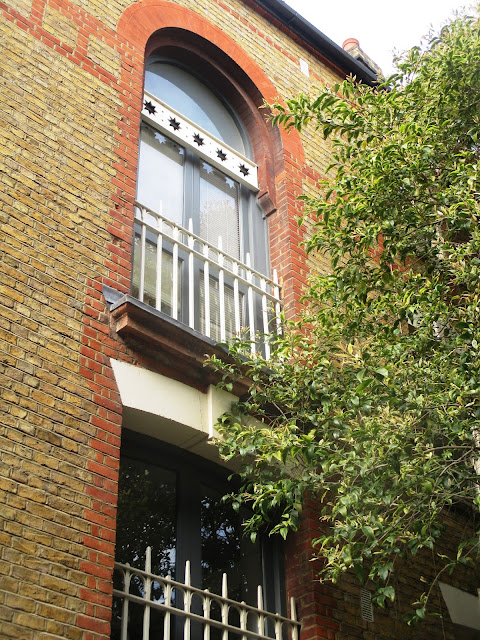I am told this column appeared in the Winter 2022 issue of the JCPCP, possibly under the title Sighcology.Henry VI founded Eton to provide free education to 70 poor boys. If you want to read how it and the other public schools wriggled out of their charitable obligations in the nineteenth century, read Posh Boys by Robert Verkaik. If you want to know what being sent away to boarding school at a tender age does to Britain’s ruling class, read Sad Little Men by Richard Beard.
As Beard told an interviewer when the book came out: "At private school you are taught not to snitch, and my book is 250 pages of snitching."
These schools tailored there regimes so they produced self-reliant men to run the British Empire in distant outposts, but they went on turning out such types long after the Empire had gone. And Beard’s argument is that a child of eight who is sent away from home into such an atmosphere has to develop a false personality to survive.
So when he opens the diary he kept at prep school he finds: "Instead of insights into my thirteen-year-old self, the diary reads like another layer of hiding, a place where I can practise lying about my feelings."
Beard finds that he used "the elaborate vocabulary rote learned in English lessons" and made sure to "show off my rhetorical devices, especially alliteration". When you add in the Latin tags and his inability to fulfil his ambition of avoiding "verbal atrocities and general waffleness," his judgement on his young self sounds fair: "Aged thirteen, my diary reads as [Boris] Johnson speaks now, in his mid-fifties."
But then there’s an element of overcompensation about the shtick of our most prominent Old Etonian politicians. Boris Johnson was first schooled with the children of Eurocrats in Brussels and then at the same North London primary school the Miliband brothers attended. He was not packed off to boarding school until he was eleven.
You suspect - or at least, as a fully qualified armchair psychologist, I suspect - that that his career since has been an attempt to live this down, to prove that he belongs in the circles he came to move in. I’ve even seen it suggested that he was originally teased for his unusual middle name, only to turn ‘Boris’ into a new persona who was everything he wanted to be.
Similarly, Jacob Rees-Mogg is said to have been a figure of fun at Eton and Oxford. The first time the broadcaster Matthew Sweet heard him speaking at the Oxford Union, he genuinely thought it was someone doing a comic turn to send up the politicos.
So when you saw him sprawled on the government front bench, Rees-Mogg was not reliving past glories but compensating himself for all that he had missed. Ideally, he would have been able to summon a fag to make toast and then find a pretext for beating him, but sprawling would have to do.
Incidentally, Beard gives us a delightful trivial fact. It’s not surprising that he cites the work of Erving Goffman on total institutions, but it is a surprise to learn that Goffman’s sister Frances Bay played the Fonz's grandmother in Happy Days.
******
I almost certainly have ADHD - or so an online survey told me the other day.
The worry used to be that the concept was medicalising childhood. Children were measured against a list of behaviours (and it looked very like a list of the things children do that most irritate adults), diagnosed and medicated. Articles were written asking if Huckleberry Finn and Richmal Crompton’s William would be put on Ritalin today.
It’s worse than that now: the whole working population may soon go down with ADHD. That survey I completed was predicated on the belief that, to prove yourself free of the condition, you must behave like a model employee of a 1950s American corporation, allocating just the right amount of attention to each task and approaching all with maximum enthusiasm.
I don’t believe anyone is like that: what the ADHD doctors are offering to treat is the human condition. Or maybe it’s the vacuum where workplace activism used to be?
******
I was clearing my late mother’s house when I heard the Queen had died. I’m not a great monarchist, but it was hard to resist the feeling that there were no grownups left to tell us what to do.
In his memoir War Doctor, the surgeon David Nott, who has worked extensively in war zones and the aftermaths of natural disasters, recalls being invited meet the Queen:
I don’t know why it happened then, or why it should have been the Queen who breached the dam. Perhaps it was because she is the mother of the nation, and I had lost my own mother. My bottom lip started to go and all I wanted to do was burst into tears.
The Queen, he later told an audience at the Hay Festival, sensed his distress, touched his hand and then whispered something to a member of her staff. A moment later, six corgis ran into the room. "They ran all the way around the room and they were barking and shouting, and two or three of them went under her legs." The Queen picked up a biscuit, broke it in two and handed half to Nott. "I thought, 'Do I eat it?', and she said, 'No, no, they’re for the dog.'"
The two then spent 20 minutes petting and feeding the corgis, bonding over their love for dogs. "There," the Queen said eventually, "that’s so much better than talking, isn’t it?"
This story was widely retailed after the Queen’s death as an example of her humanity and wisdom. Some disagreed, seeing it as yet another example of the fatal British stiff upper lip - see Beard passim - and in particular of our unwillingness to talk about mental distress.
But surely there is a role for comforting too? As clients or professionals, we can’t always be engaged in heroic therapy.




























